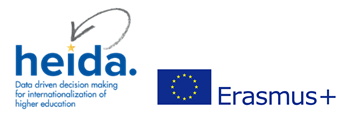Output 1 – Research Report
A desk based literature review was conducted between January-March 2015 by ISSBS to provide a clear conceptual and methodological framework that guided the design and implementation of the internationalization data sharing tool and training component. The review was complemented by the findings and reflections of a stakeholder workshop held in Istanbul on April 28th, 2015 with representatives of Turkish higher education institutions.
This review looked at the concepts of internationalization in higher education at the institutional scale, dimensions and levels. It also looked at why it is important to measure and monitor internationalization in HEIs and provided a map of the most comprehensive indicator tools and/or approaches developed to date by different organizations.
For more details or questions about this report you can email us at heida@ku.edu.tr
Output 2 – Case studies report
The three project partners conducted a series of one-to-one interviews, focus groups, surveys and desk research between May – September 2015 to understand how data is managed and used at their institutions and how does this apply to internationalization data and indicators.
Through this exercise we were able to see similarities and differences between institutions and specific areas for improvement and best practices that could be shared with other European higher education institutions. The case studies report provides an overview of each institution, the key findings of each stakeholder consultation exercise and a summary of best practices.
For more details or questions about this report you can email us at heida@ku.edu.tr
Output 3 – Online questionnaire to European HEIs and HEIDA Online Tool
Between February – April 2016 European higher education institutions were asked to provide answers to an online questionnaire as part of the HEIDA project. The questionnaire looked into general data management practices at the institutions and then asked respondents to select 10 internationalization indicators from a shortlist of 30 indicators. These 30 indicators were selected from the list of almost 500 indicators developed by the IMPI Project. To download the list of IMPI internationalization indicators click here.
The questionnaire then asked respondents to provide information about how, when and where was the data collected and used for building each indicator and to provide their overall feedback on the exercise. The results of the questionnaire were used to assist the team in designing an online software data collection and sharing tool (the HEIDA tool beta version) in terms of lenght, steps and functionality.
Over 100 European higher education institutions participated, with the biggest participation coming from Turkish institutions.
You can now find and test the HEIDA Online Tool and its user manual on the “The Tool” section of this website.
For more details or questions about this output or if you want to try the HEIDA online tool at your institution please email heida@ku.edu.tr
Output 4 – Online training resource
The team has deveoped an online training resource hosted on the e-learning platform Moodle and available to all higher education institutions for free. The training resource covers the topics of decision making and the use of data, internationalization using data, and practical guidance on how to use the HEIDA online tool beta version.
For more details or questions about this report you can email us at heida@ku.edu.tr
Output 5 – Evaluation Report
The final output of the project consists in a review of final changes and revisions made to the online HEIDA tool and training module based on feedback received from potential users in the partner institutions and from suggestions received from participants at the different dissemination events organised by the project team.
